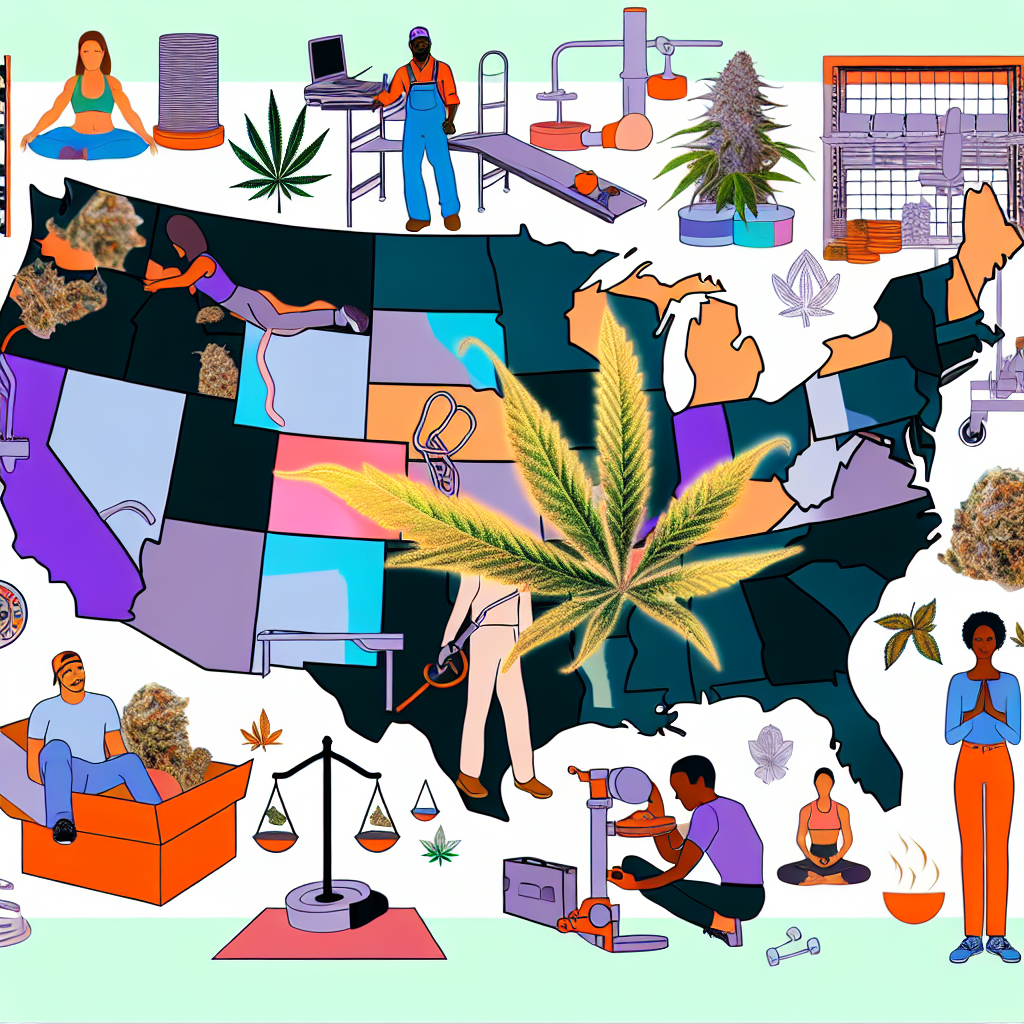Workplace Cannabis Wellness: Legal and Safety Considerations by State
Introduction: A New Era of Workplace Wellness
As cannabis continues to gain mainstream acceptance across the United States, a new cultural and regulatory challenge has entered the discussion: cannabis in the workplace. With 38 states and the District of Columbia having legalized medical marijuana and 24 states legalizing recreational use as of 2024, there is a growing need for both employers and employees to navigate the evolving guidelines surrounding workplace cannabis wellness programs.
Workplace wellness programs have traditionally focused on physical health incentives, mental well-being, and professional development. However, with increasing evidence pointing to cannabis’s potential in alleviating anxiety, chronic pain, sleep disorders, and stress—conditions that significantly affect productivity and employee satisfaction—businesses are beginning to explore how cannabis might fit into overall wellness offerings.
The key challenges lie in reconciling these benefits with federal illegality, safety-sensitive job responsibilities, and varying state laws.
Employers must grapple with a patchwork of state-level cannabis policies that impact everything from drug testing to anti-discrimination protections. For example, some states, like New York and New Jersey, have explicit employee protections for lawful cannabis use off duty, while others—including Texas and Georgia—maintain stricter, zero-tolerance approaches. These legal differences significantly affect not only hiring practices but also ongoing wellness initiatives, occupational safety, and corporate liability.
Further complicating matters are federal regulations, particularly from the Occupational Safety and Health Administration (OSHA) and the Department of Transportation (DOT), which currently do not recognize cannabis use and may require drug testing regardless of state laws. This is particularly vital in safety-sensitive industries like construction, transportation, and healthcare.
Nevertheless, companies that carefully observe local laws while crafting wellness policies that incorporate flexible cannabis accommodations are poised to boost employee morale, improve health outcomes, and reduce turnover. That said, such policies must also be balanced with robust safety protocols and clear communication strategies to ensure a productive, safe, and legally compliant work environment.
More than ever, HR professionals, cannabis clinicians, and business owners need to understand the nuances of cannabis regulation at the state level, how it intersects with federal law, and what studies are revealing about cannabis’s role in employee health. Let’s dive into what the latest research and regulations reveal about cannabis wellness in the workplace.
The Science Speaks: Research Backing Cannabis in Workplace Wellness
As the cannabis industry matures, research into its potential role in workplace wellness is also expanding. While workplace cannabis use remains a complex topic, evidence suggests that under carefully controlled conditions, cannabis may offer tangible benefits for employees dealing with chronic conditions like pain, anxiety, and insomnia—ailments that cost billions annually in lost productivity.
A 2020 study published in the journal Health Economics found that in states where medical marijuana is legal, workers with chronic health conditions were more likely to remain employed and reported fewer sick days. This suggests therapeutic cannabis use may support job retention and reduce absenteeism.
Moreover, a 2022 research article in the Journal of Occupational and Environmental Medicine explored the correlation between cannabis legalization and worker compensation claims. The results were promising: states with legalized medical cannabis experienced a 7% reduction in the volume of these claims, indicating that cannabis may be mitigating workplace injury recovery challenges—potentially replacing more dangerous options like opioids.
On the mental health front, a clinical trial published in 2022 by the Journal of Clinical Psychology revealed that CBD-dominant cannabis formulations significantly reduced anxiety and stress levels in patients unresponsive to traditional treatments. Given that approximately 83% of US workers experience workplace stress, according to the American Institute of Stress, incorporating CBD into wellness plans could have transformative potential.
Safety First: Navigating the Risks of Cannabis at Work
Despite promising data, workplace cannabis programs are not without risk.
A 2021 systematic review published in JAMA warned that THC-containing cannabis products could impair attention, judgment, and reaction times—concerns that are particularly significant in safety-sensitive roles such as driving, machinery operation, and healthcare.
To address these risks responsibly, progressive companies are turning to wellness models that focus on:
– Microdosing with minimal psychoactive effects
– CBD-based products that lack intoxicating properties
– Off-duty usage policies to avoid on-the-job impairment
Some businesses are even working with cannabis clinicians who offer employees guidance on personalized cannabis wellness plans, enhancing both efficacy and safety.
Legal Patchwork: State vs. Federal Laws and Employer Liability
Employers must walk a fine line between state and federal regulations.
States such as California, Nevada, and Illinois have implemented legislation that requires employers to accommodate off-duty medical cannabis use—unless the employer can show it negatively impacts job safety or performance.
Meanwhile, federal bodies like OSHA and the DOT continue to classify cannabis as illegal, requiring drug testing for employees in regulated industries.
This discrepancy creates a critical need for:
– State-specific compliance policies
– Clearly outlined job descriptions
– Legal counsel engagement for HR teams
Fortunately, tools like the NORML State Law Map make it easier to track current cannabis employment policies by state, offering clarity to multi-state operators and organizations building compliant HR strategies.
Innovation in Action: Workplace Cannabis Wellness Programs in Real Life
Several forward-thinking companies have launched pilot programs that integrate cannabis education and consultation into employee wellness packages. Features include:
– Virtual one-on-one sessions with trained cannabis clinicians
– Educational seminars covering responsible use and legal rights
– Clear workplace usage policies formulated with legal oversight
These programs, often emphasizing non-psychoactive cannabinoid use and performance metrics, show early results in boosting employee morale and reducing sick leave rates—especially in physically and mentally demanding sectors.
Conclusion: A Wellness Frontier Worth Exploring
Workplace cannabis wellness is not a distant concept—it’s here, and it’s evolving. With more state laws shifting toward inclusive cannabis accommodations and growing clinical research validating therapeutic use, businesses have a golden opportunity to improve employee well-being in innovative, legally compliant ways.
By crafting tailored policies grounded in science, respecting the legal landscape, and emphasizing safety above all, companies can embrace cannabis wellness strategies that enhance productivity, reduce turnover, and future-proof their employment offerings.
**Summary:**
The article explores the evolving landscape of workplace cannabis wellness programs, examining the legal and safety considerations that employers must navigate. It delves into the scientific research supporting the potential benefits of cannabis in addressing employee health issues, while also addressing the risks and the need for responsible policies. The article highlights the legal patchwork created by the discrepancy between state and federal laws, and showcases innovative real-world examples of companies integrating cannabis wellness into their employee offerings. Ultimately, the article encourages businesses to explore this frontier, emphasizing the importance of crafting science-based, legally compliant, and safety-focused cannabis wellness strategies.




